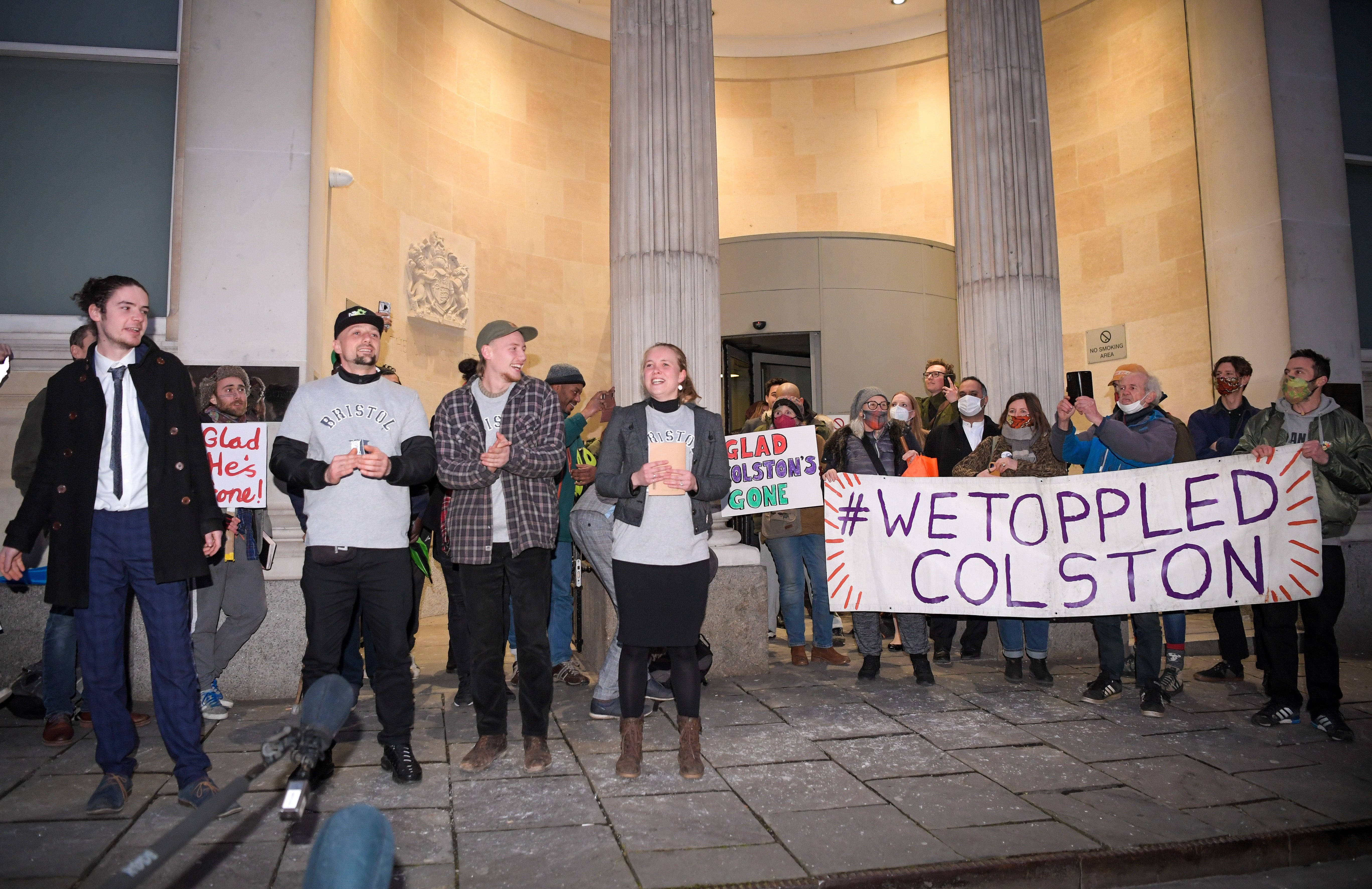The government is undermining the idea of trial by jury after Colston Four verdict
The ability of a jury to acquit a defendant in spite of the evidence is a necessary “safety valve” in our system of justice


In January 2022, four protesters from Bristol – called the “Colston Four”, charged with toppling the statue of Edward Colston, a 17th-century slave trader – were acquitted by a jury.
The Colston Four admitted pulling down the statute, thereby damaging it. Much of the Prosecution evidence was on camera and uncontested. The defendants called evidence of Colston’s deep involvement in the evil transatlantic trade and how the statute represented a “hate crime”. They said they had a lawful excuse for their actions – they were entitled to freedom of speech and expression and that the statute itself was a breach of the Public Order Act in that it incited hatred.
What happened next was surprising. The Attorney General, Suella Braverman, said she would ask the court of appeal for clarification on whether defendants such as the Colston Four can use a human rights defence in a criminal damage case in the future (The current verdict cannot be overturned).
It’s important to understand what happened here. As always, there are wails of disapproval from some parts of the media and from Government Ministers when a jury acquits in the face of the evidence.
The hallmarks of a political trial were present from the outset. The facts arose from a Black Lives Matter protest which was political and social in nature. Sections of the press and some Conservative MPs were quick to condemn the participants and sought prosecution of the crowd. That the Home Secretary was said to put pressure on the Crown Prosecution Service to prosecute, did not help. The appeal by the Attorney General (which is a power rarely exercised) amid partisan comments by Cabinet Ministers adds political fuel to the process. All this at a time when the Government is pushing legislation through Parliament which will curtail the right to protest.
The trial judge gave the jury a “route to verdict” during the case, which required them to go through a series of questions of fact in their deliberations. The last question was whether they believed a charge of criminal damage was a “proportionate interference” with the defendants’ rights to freedom of expression, thought and conscience. It is on this question that commentators believe the Jury found the defendants not guilty. It is this aspect of the legal directions given by the judge that the Attorney General, Suella Braverman, is appealing.
There is a danger that this appeal looks like a challenge to the idea of Trial by jury entirely.
The “perverse verdict” has a long and noble history. It has helped to shape our system of justice. In almost every “perverse” verdict case, there is a compelling explanation for it. It is often because the jury is not happy with a particularly outdated or unfair law; or because the sentence for it is unnecessarily harsh; or because the Prosecution is politically motivated or brought with perceived mala fides; or the judge has not been fair in the trial; or simply because “the law is an ass”.
The reality is that the jury (chosen randomly from an area in Bristol, and which is deemed to be representative of the local community) probably came to a sensible conclusion – that these youngsters should not have been prosecuted and that it was not in the public interest to do have done so.
In 2001, two protestors were acquitted of a conspiracy to damage a Trident nuclear submarine. Sylvia Boyes and Keith Wright admitted that they intended to cause damage, because they believed nuclear weapons were illegal and immoral. The trial judge had told jurors that the two protesters could be seen as "thoroughly decent and idealistic people" doing what thought was right. But however genuine the activists’ beliefs, he said ideals formed no defence against a criminal damage charge. Despite this, the jury acquitted both defendants. In 1996, two women were acquitted by a Liverpool jury in similar circumstances of causing £1.5m damage to a fighter jet.
Clive Ponting, a Ministry of Defence official, was charged under the Official Secrets Act for disclosing that government ministers had misled Parliament over the sinking of the Argentine warship General Belgrano during the Falklands War. He admitted the disclosure and the judge made it clear to the jury that there was no defence in these circumstances. He said he was acting in the public interest. At the end of the trial in 1985, the jury acquitted him. Commentators who watched the trial believed one reason was that the jury felt the law was unfair, the judge was strident, and in these circumstances the defendant had done the right thing.
To keep up to speed with all the latest opinions and comment, sign up to our free weekly Voices Dispatches newsletter by clicking here
Again, such verdicts should be applauded rather than criticised. The ability of a jury to acquit a defendant in spite of the weight of the evidence is a necessary “safety valve” in our system of justice. It allows a finer calibration between the will of the State and the will of the People.
The usefulness of a “perverse verdict” is that it is a way of smoothing the spikes of the law, sprinkling some fairness in unusual circumstances where an otherwise fair law might cause injustice. It is an essential check and balance that strengthens respect for the law.
It is a valuable corrective that allows twelve representatives of The People to say “we will not allow this unfairness”.
Sailesh Mehta is a Barrister specialising in human rights and regulatory law
Join our commenting forum
Join thought-provoking conversations, follow other Independent readers and see their replies
3Comments